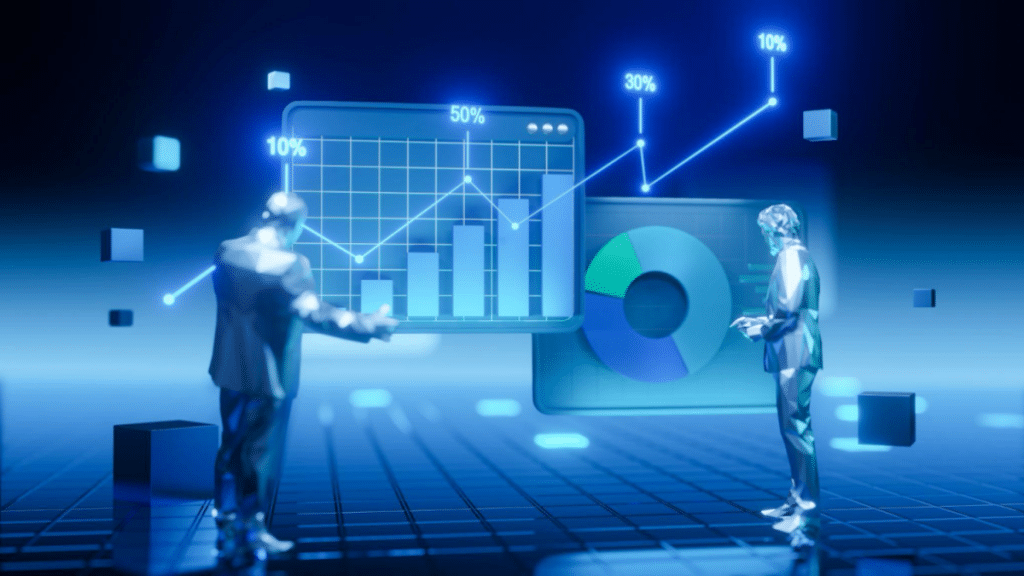Data is the fuel driving modern businesses, powering growth and innovation across industries. Yet, the sheer volume of data generated today poses a significant challenge: how can businesses effectively harness this information? Traditional data analysis methods often require time-intensive processes and specialized expertise, leading to bottlenecks that delay actionable insights and hinder decision-making. Advancements in generative AI development are overcoming these challenges. Generative AI, with its ability to automate complex tasks and uncover hidden patterns, offers a transformative solution to accelerate data analysis and provide deeper insights faster than ever.
The rise of AI agents for data analysis—powered by generative AI development offers a game-changing solution to modern data challenges. These intelligent systems automate repetitive tasks, freeing human analysts to focus on more strategic, value-added activities. Studies show that AI can reduce decision-making time by up to 40%, allowing businesses to act swiftly on opportunities and risks. As AI development continues to evolve, the adoption of generative AI technologies is accelerating, with companies across various sectors recognizing the competitive edge offered by these systems. Research indicates that 30% of large organizations already leverage AI to monitor over half of their business data, with generative AI playing a key role in transforming how businesses operate.
What Are AI Agents for Data Analysis?
An AI agent for data analysis is an advanced digital assistant, often powered by generative AI development, tailored for managing large volumes of data. These agents utilize machine learning algorithms and sophisticated analytical techniques to transform raw data into actionable insights. By automating processes like data cleaning, integration, and analysis, AI agents streamline previously resource-intensive tasks. With generative AI, these agents can also generate predictive models, discover patterns, and provide insights that would otherwise be difficult for humans to uncover.
Imagine an AI agent as a virtual expert, performing the dual roles of a statistician and strategist. These agents, driven by the capabilities of generative AI development, excel at identifying trends, outliers, and correlations in datasets that might otherwise remain hidden. The ability of generative AI-powered agents to process massive datasets swiftly allows businesses to gain real-time insights that can drive better, faster decision-making. Industries like finance, healthcare, e-commerce, and manufacturing are all benefiting from the enhanced capabilities of generative AI to improve their operational efficiency and strategic planning.
Key Characteristics of AI Data Analysis Agents
AI agents for data analysis, particularly those utilizing generative AI development, combine advanced capabilities across multiple domains:
Comprehensive Data Management
- Automated data collection: Gather information seamlessly from databases, APIs, web scraping, sensors, and IoT devices.
- Intelligent integration: Unify disparate data sources into a cohesive view for analysis.
- Advanced data cleaning: Address errors, fill gaps, and ensure data quality.
- Efficient processing: Sift through vast datasets, separating noise from critical insights.
- Data transformation: Prepare data through normalization, scaling, and formatting.
Advanced Analysis Techniques
- Exploratory Data Analysis (EDA): Visualize data with histograms, scatter plots, heat maps, and more.
- Predictive analytics: Leverage machine learning models to forecast outcomes.
- Prescriptive analytics: Provide actionable recommendations for decision-making.
- Anomaly detection: highlights irregularities, signalling opportunities, or risks.
Real-Time Insight Generation
- Rapid processing: deliver insights in near real-time for industries requiring agility.
- Proactive monitoring: Continuously scan data streams for emerging trends.
Natural Language Processing (NLP)
- Text analysis: Extract sentiments, topics, and key entities from textual data.
- Conversational interfaces: Facilitate intuitive queries and explanations through natural language.
Advanced Visualization and Reporting
- Interactive dashboards: Provide real-time, drillable data visualizations.
- Automated reporting: Generate concise, tailored reports for stakeholders.
By combining these features, AI agents streamline the data analysis process, empowering decision-makers to act with speed and confidence.
How AI agents for data analysis work
The development of generative AI enhances AI agents by building them on a foundation of interconnected components, each of which plays a pivotal role in transforming data into actionable insights.
Core Components
- Agent Core: Serves as the “brain,” coordinating all analysis tasks.
- Goal definition: Tailors analyse to specific objectives, like forecasting trends or identifying bottlenecks.
- Tool utilization: Manages tools such as SQL, visualization platforms, and statistical software.
- Planning Module: Breaks complex problems into manageable steps.
- Task decomposition: Structures multi-faceted analyses, such as examining customer churn.
- Reflection: Refines plans to ensure a comprehensive approach.
- Agent Memory (RAG): Powers context-aware analysis through short-term, long-term, and hybrid memory systems.
- Short-term memory: Tracks ongoing analysis steps.
- Long-term memory: Stores historical insights for reference.
- Data Analysis Tools:
- SQL/Pandas generators for extracting structured data.
- Calculators for statistical operations.
- Visualization tools for charts and graphs.
- Databases: Access structured and unstructured sources to provide comprehensive insights.
Workflow
- User Request: The user initiates an analysis, such as “Evaluate marketing ROI for Q3.”
- Task Breakdown: This method divides the query into actionable steps.
- Tool Utilization: Employs advanced tools for processing and visualization.
- Memory Integration: Leverages stored knowledge to enhance results.
The compilation of results provides comprehensive, actionable insights along with supporting visuals.
Transforming industries with AI agents.
From real-time fraud detection in finance to optimizing patient care in healthcare, AI agents for data analysis are revolutionizing industries. By streamlining workflows, enhancing data accuracy, and uncovering actionable insights, these agents empower businesses to thrive in a competitive, data-driven landscape.
Investing in AI agents is not just about staying relevant; it’s about gaining a significant competitive edge. For organizations aiming to unlock the full potential of their data, AI agents for data analysis are no longer optional they’re essential.
This version ensures a more thorough exploration of the original points, adding additional depth and industry-specific examples. Please let me know if you require any additional modifications!
